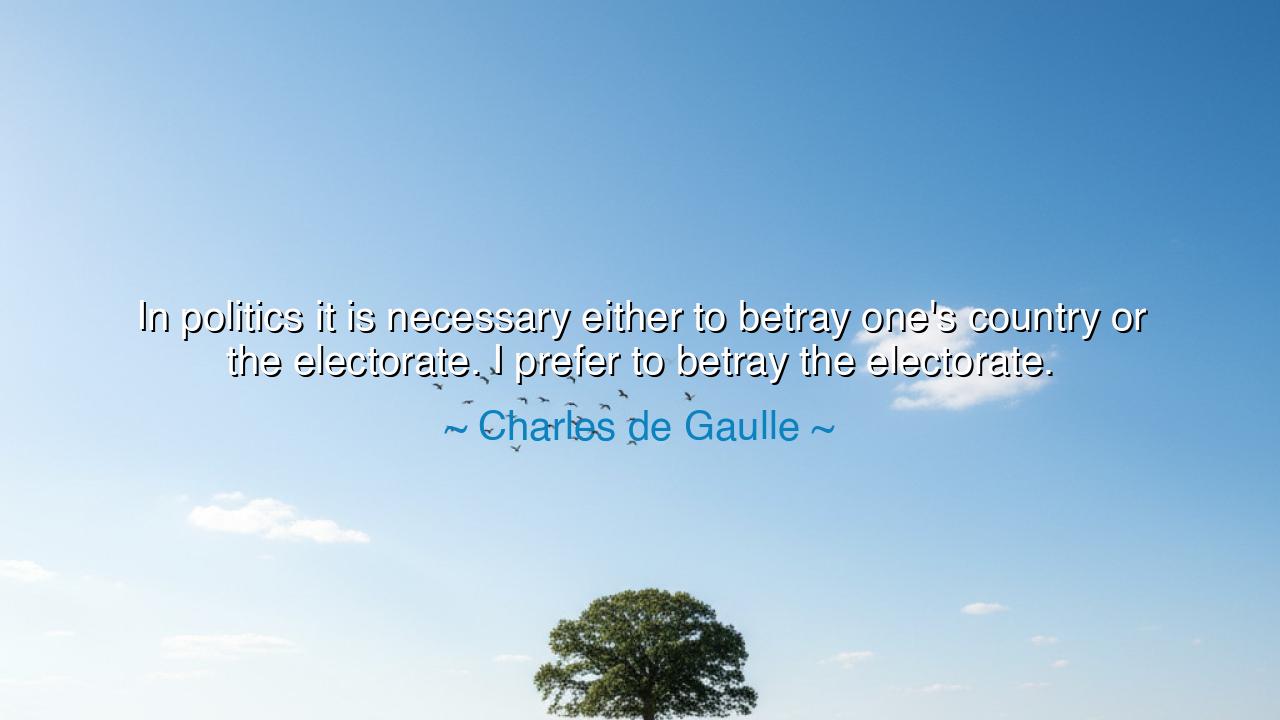
In politics it is necessary either to betray one's country or
In politics it is necessary either to betray one's country or the electorate. I prefer to betray the electorate.






The words of Charles de Gaulle — “In politics it is necessary either to betray one’s country or the electorate. I prefer to betray the electorate.” — strike with the gravity of iron and the sorrow of a heavy crown. They reveal the burden of leadership, the torment of choosing between pleasing the people in the moment and preserving the destiny of the country for ages to come. De Gaulle, soldier and statesman, speaks as one who bore the weight of both war and governance, and who knew that the clamor of the crowd is fleeting, while the fate of a nation endures.
In these words lies a hard wisdom. The electorate, in its passion, may demand what is easy, popular, or comforting, but the guardian of the country must see further, beyond the veil of the present, into the uncertain horizon of tomorrow. To betray the people’s immediate desires may bring anger, even hatred, but to betray the country itself is to invite ruin that cannot be undone. Thus de Gaulle proclaims his choice: better to endure the wrath of the people than to abandon the soul of the nation.
History itself proves the weight of this saying. When de Gaulle stood during the crisis of Algeria, he faced the fury of many in France who wished to cling to colonial power. Yet he chose the path of independence for Algeria, seeing that to chain a people against their will would ultimately poison France herself. In that moment, he “betrayed” the electorate, who had trusted him to preserve empire, but in truth he safeguarded the country, saving it from endless war and moral decay.
This lesson is not gentle, but stern. It teaches that true leadership is not flattery, nor obedience to every cry of the crowd, but a willingness to make choices that may wound in the present yet heal in the future. The electorate may feel deceived, but the country, greater and longer-lived than any single generation, will remember the courage of one who placed its survival above all.
Let these words be passed to those who will rule in days yet to come: in the realm of politics, it is better to endure the anger of today than to forsake the future of the land. For the will of the people shifts like the tide, but the fate of the country is carved upon the stones of eternity. And in this choice, as de Gaulle teaches, lies the true measure of a statesman.






HPHieu Pham
De Gaulle's quote presents a grim view of politics, where betrayal seems inevitable. Is this how we should view politicians' decisions? What does it say about the integrity of political leaders if they feel forced to betray their electorate or their country? Can we rethink the system so that politicians don’t have to make such impossible choices? Or is this just the way politics has always worked?
YNY Nhu
De Gaulle’s statement seems to suggest that betrayal is a necessary evil in politics, but does this perspective undermine trust in political leaders? Shouldn't the goal of politics be to serve the best interests of both the country and the electorate, without compromise? How do we balance the realities of political maneuvering with the need for ethical leadership? Is it really a matter of betrayal, or are there better ways to navigate political challenges?
DTduy tam
This quote from de Gaulle is shocking but could be seen as an honest acknowledgment of the difficult realities in politics. Is it truly impossible to stay loyal to both the country and the electorate? Could this statement reflect the conflict many leaders face between what is politically expedient and what is best for the public? Should we expect more from our politicians, or is this just the nature of politics?
TCAnh Thu Cao
Charles de Gaulle’s quote is both blunt and cynical, suggesting that politics is inherently a game of betrayal. Is this how the political system really works? Does it mean that politicians are forced to choose between loyalty to their country or their voters? It raises important questions about the ethical compromises politicians must make. Could this kind of perspective contribute to the distrust many people have in politics?